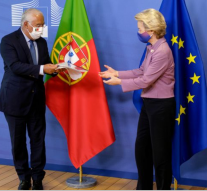
Why migration policies are lacking among the Portuguese EU Presidency priorities?
Migration 22 January 2021“Time to deliver: a fair, green and digital recovery” is the motto of Portuguese fourth EU presidency, which faces numerous challenges during the Covid-19 pandemic. These priorities set the list of several issues that the EU might consider in the first half of this year. However, there is no mention of migration and immigration policies listed within the document presented on the official presidency website. Truth to be told: there are some gloomy fading mentions of the asylum policy. But why the situation looks like this? Is Europe tired of migration issues?
Portugal is committed to promote the EU’s recovery, its values, and cohesion through continuation of the negotiation of the new Pact on Migration and Asylum, in order to establish a comprehensive and integrated Europe-wide approach, striking a balance between prevention of irregular immigration, promotion of sustainable channels for legal migration and integration of migrants, geared to safeguarding human rights. This is the only mentioning of the policy towards the migrants. Some EU Member States, especially the Southern ones expressed their worries over what might be(come) the biggest problem in the near future.
Euractiv reported that the in an interview with El Pais, Margaritis Schinas, the Vice-President of the European Commission behind the proposal, said he was optimistic that there is room for agreement between Southern EU countries, which are at the frontline of the migration crisis, and the Visegrad group of Central European states, which are the most vocal opponents to a common EU migration policy. “We must oppose the populist front by showing that the EU can solve the problem of migration,” Schinas said. Schinas considers the new proposal as the best possible option which can satisfy all sides. “The south will have the certainty that there will be effective and permanent solidarity and the east we will be given the option not to have forced relocations but equivalent measures,” Schinas said. “The country that does not want refugees will be responsible and will finance the returns in the name of the 27,” he added. Southern EU countries, which bear the greatest burden of migration, have said that the proposal is a good starting point but called for further changes to be made.
As 2021 begins with a promising Covid-19 vaccine in sight, the International Organization for Migration (IOM) encouraged the Portuguese Presidency of the Council of the European Union (EU) to advance an ambitious, forward-looking reform of European migration policy that engenders recovery from the pandemic and long-term resilience. In recommendations to the Presidency released on January 15th, IOM outlined four targeted policy proposals that highlight well-managed human mobility and community-centred actions as key contributors to achieving a global, digital, safe and resilient Europe.
“Our recommendations converge on the view that integrating migration and reimagining mobility across sectors – including health, climate, development and the digital agenda – can help us build back from the pandemic and strengthen our approach to the challenges on the horizon,” said António Vitorino, IOM Director General. IOM, therefore, encourages the Portuguese Presidency to adapt immigration and border management schemes in a coordinated, health-sensitive and future-oriented way. The EU’s transformation towards a Digital Europe can spearhead the rollout of innovative digital tools that support migration processes, enhance security and protection of identity, and provide contactless passage that reduces sanitary risks. IOM also stresses the importance of strengthening safe and legal pathways for protection.
To demonstrate solidarity with partner countries, IOM calls for a dialogue among EU Member States to increase resettlement and relocation efforts within a durable and predictable European framework. Finally, a Resilient Europe will rely on flexible and accessible skills-based migration channels that are mutually beneficial, target migrants at all skill levels, and protect their rights. IOM believes it will be equally important to strengthen cohesion in European societies and communities by advancing the integration of migrants through broader social inclusion.
Both the EU Member States and some international organizations have criticized what Portugal omitted to include within the presiding priorities which would relate to the migrants issues. However, this does not mean that in the practice, the EU within the supranational level cannot cooperate and work towards better standards for immigrants despite the strong pressure coming by the ongoing pandemic of the Covid-19.



